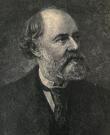A popular English novelist and dramatist during the nineteenth century, Charles Reade is best remembered for The Cloister and the Hearth, a medieval romance. He completed a Bachelor degree at Magdalen College, Oxford, in 1835 and later became dean of arts and vice-president. In 1836 his name was entered at Lincoln's Inn in 1836. He was elected Vinerian Fellow in 1842, and called to the bar in 1843. Shorlty after completing a Doctor of Civil Law (D.C.L.) degree in 1847 he moved to London and abandoned law in favour of a literary career.
Reade began his new career as a dramatist, producing his first comedy, The Ladies' Battle at the Olympic Theatre in May 1851. It was followed by Angela (1851), A Village Tale (1852), The Lost Husband (1852), and Gold (1853). He established his theatrical reputation in 1852 with the two-act comedy, Masks and Faces, a collaboration with Tom Taylor, and as a novelist two years later with It is Never too Late to Mend. The novel was written as a means of trying to bring attention to abuses in prison discipline and the treatment of criminals. His greatest success as a dramatist, and also his last play produced before his death, was Drink (1879), an adaptation of Émile Zola's L'Assommoir.
Some of Reades plays were produced in the Australian colonies in the nineteenth century. Others were adapted and/or burlesqued during the same period.
 2537679394201070979.jpg
2537679394201070979.jpg